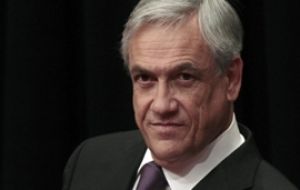MercoPress. South Atlantic News Agency
Piñera promises 7.2% of GDP for education trying to calm protesting students
 The Chilean president reads the budget and appeals to students
The Chilean president reads the budget and appeals to students The Chilean government proposed a 5% increase in public spending and a 7.2% gain in education outlays next year as it tries to end four months of protests that have seen a quarter of a million students miss classes and weekly battles with the police.
Total fiscal spending will exceed 60 billion dollars next year, President Sebastian Piñera said in a televised address. Congress has until the end of November to approve the spending plans.
The budget, Piñera’s second as president, aims to help reduce the cost of education for families, alleviate poverty and fight crime, he said. Spending growth is in line with economic growth forecasts and won’t represent a threat to the fiscal austerity that has made Chile the only country in the Americas that is a net creditor.
“We all want to grow faster but to go far we have to grow on rock not sand,” he said. “The 2012 budget has been designed especially with the needs and aspirations of our middle class and most vulnerable sectors in mind.”
The government plans to spend 11.65 billion dollars on education and create a 4 billion fund for scholarships, the biggest education outlay in Chile’s history, Piñera said.
That is unlikely to stop protests that saw thousands of students march in downtown Santiago yesterday. In what has become a weekly ritual, the march ended in running battles with the police, who doused the area in teargas.
Protesters want more than the government has been offering and will continue demonstrating, student leader Camila Vallejo anticipated. The 4 billion dollars education fund would be spent over four to six years, Radio Cooperativa reported, citing Deputy Finance Minister Julio Dittborn.
Finance minister Felipe Larrain also anticipated that parallel to the budget Congress should debate tax review. “We need to discuss whether tax reform would be aimed at redistribution, investment promotion or expanding on ways to strengthen economic growth.”
The Piñera administration plans to post a fiscal surplus equivalent to 1.3% of GDP in 2011 and shrink the structural deficit from 3% in 2009 to 1% in 2014, Larrain said. The structural target takes cyclical swings in the economy into account.
“Make no mistake: We will keep a firm handle on the economy,” said Larrain, who next week is scheduled to provide his GDP forecast for 2012 to Congress. “Fiscal discipline is non-negotiable.”
The central bank estimates the economy will grow 6.25% to 6.75% this year before slowing to 4.25% to 5.25% in 2012, according to its latest monetary policy report.
Larrain is developing a contingency plan in case the global economy deteriorates further that may include tapping Chile’s 18 billion dollars in sovereign funds, he said Sept. 22 in Washington.




Top Comments
Disclaimer & comment rules-

Read all commentsThis is, in many senses, a zero sum game of inputs having to match outputs.
Oct 01st, 2011 - 01:58 pm 0If spending on social provisions is to increase so massively, then state income will have to increase by the same amount. The equation can be modified on both sides - eg. the state can borrow itself out of trouble, short-term; or it can generate bigger income surplusses from overseas trade - but, essentially, a bigger state spend demands bigger taxes and a wider tax-base.
So, anticipate a big crack-down on tax-evasion, and on the hidden (untaxed) economy, increase in administrative efficiencies like job-cuts and pension restrictions, full repayment of the costs of higher education by the graduates themselves, and more people captured in the tax-net.
These structural changes WILL take 5-10 years to fully emplace and bed-down, will span terms of office, and so will need the agreement-in-principle of both the government and the oppositions. This agreement is needed to reduce and remove street protest and street violence.
A return to governance through the practice of democracy is sorely needed.
Commenting for this story is now closed.
If you have a Facebook account, become a fan and comment on our Facebook Page!